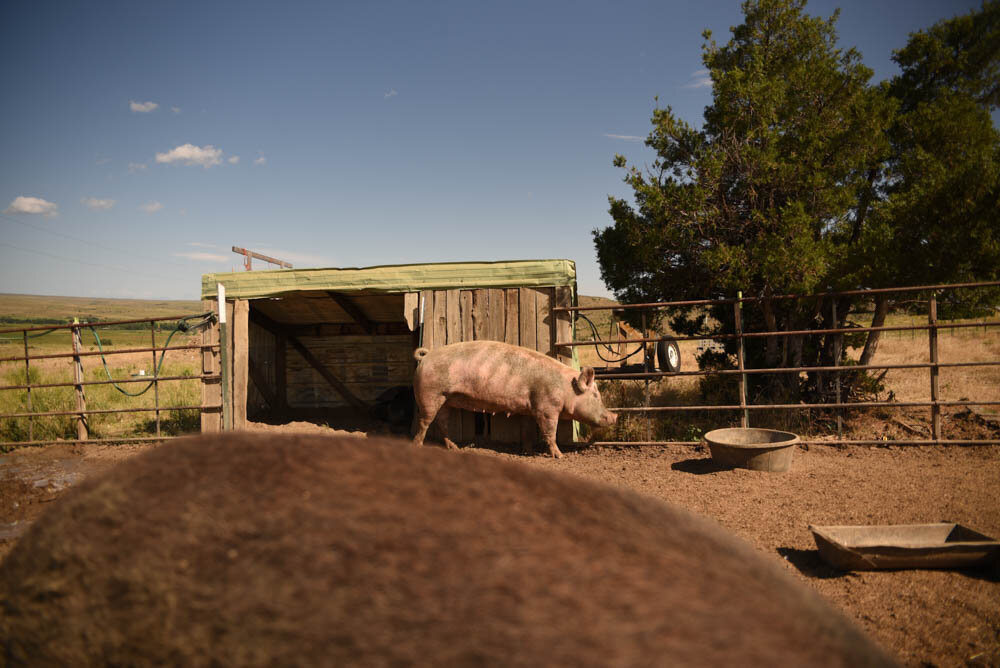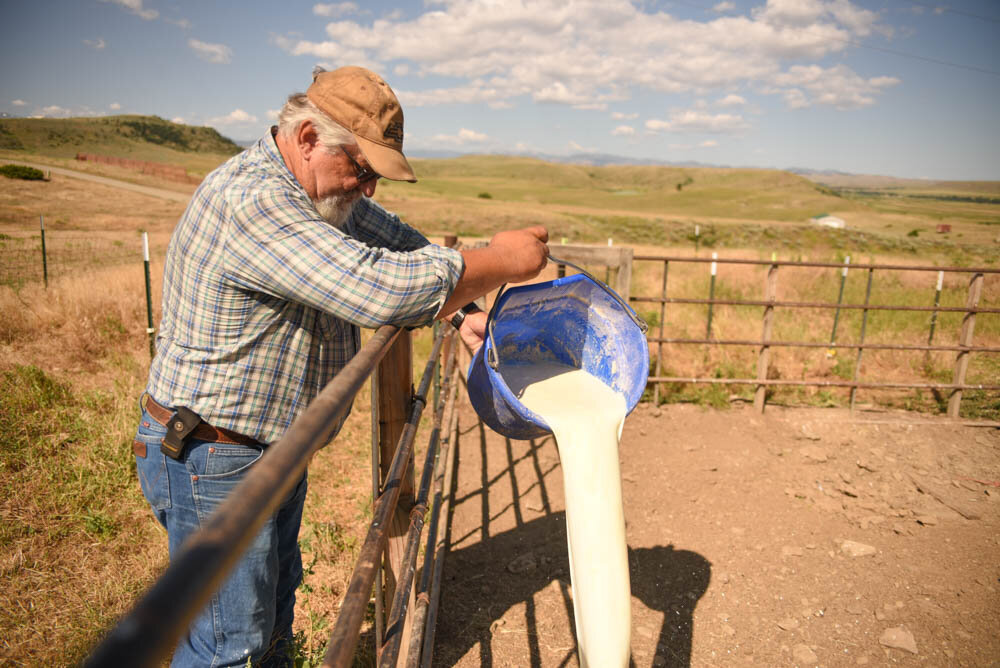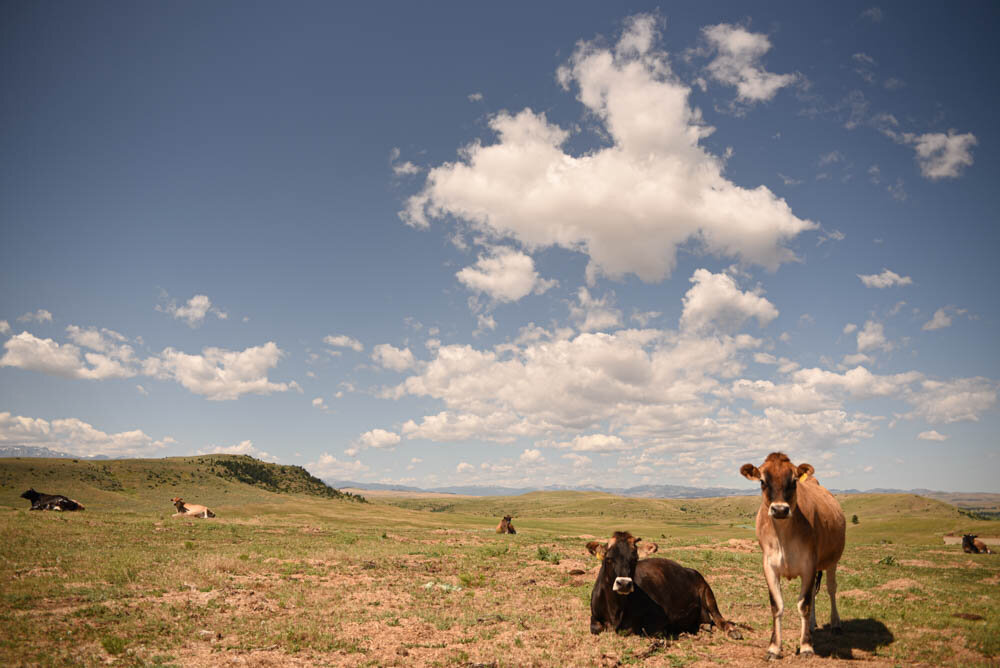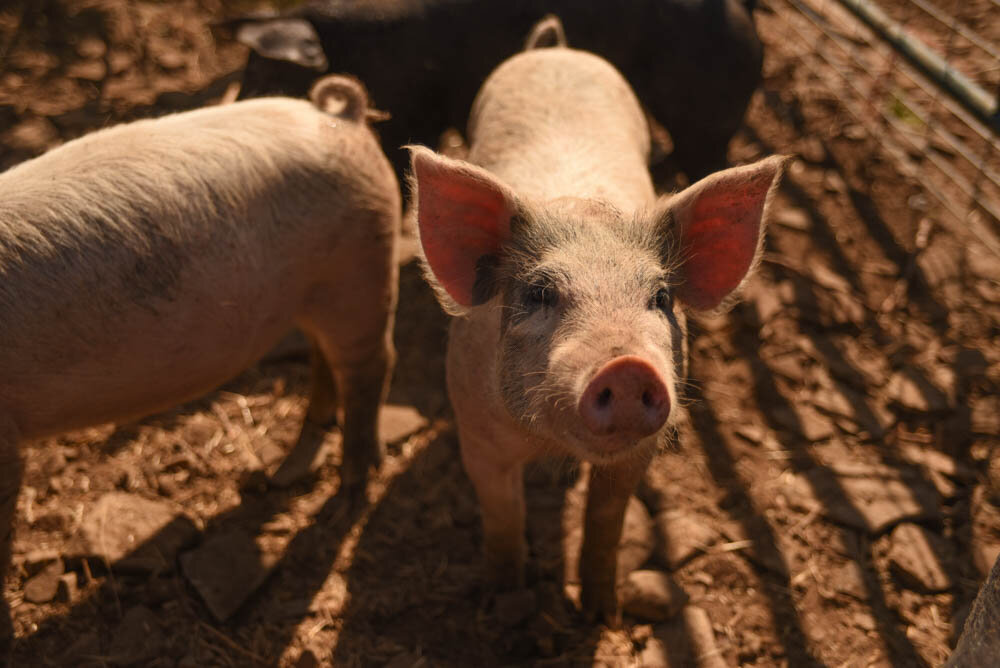Increased support for local foods offers a rare silver lining during Covid crisis
Lyle Strobel has a contagious smile that radiates the pride that his humble persona camouflages. The dust settles from grain that poured from his tractor into the feed trough. “That’s about all there is to it,” he said, brushing his hands off on his blue jeans as he finished the morning chores on the farm.
Lyle started raising livestock because he wanted to know where his family's food was coming from, an idea that is foreign to the majority of Americans. The ongoing disconnect between the public and the food that they consume has Lyle and many others hopeful that changes are coming. “If you know who I am, what I'm trying to do is to take care of some land in a reasonable fashion and to raise healthy food. I hope that invokes a respect, or at least an understanding of me,” said Lyle.




Crazy Bear Farm sits on top of a picturesque hill outside of Absarokee, MT. The farm is owned and operated by Lyle and his wife, Irene. Their cattle appear to graze amongst the clouds in the open Montana skies, as the sounds of bellowing pigs carry over open fields. Both Lyle and his wife grew up working on farms but it was their children’s interest in 4H that brought them back to the lifestyle.
In 2017, Northern Plains Resource Council contacted Lyle to gauge his interest in being part of the Yellowstone Valley Food Hub. The Food Hub is a farmer-owned and operated co-operative. “There’s a lot of adventure left in this journey,” said Lyle. He has seen a lot change over the course of the last few years since he started with the Food Hub in its infancy. He watched it expand and grow into what it is today, a 18 farmer operation, selling herbs, produce, breads and meat.
“I don't think there's one of us who wouldn't be happy to show you around their place or visit with you and get to know the customers. In fact, one of the things that's enjoyable about the food drops on Thursdays is being able to visit with the folks that are buying your product. And we take pleasure in that and I hope they do too,” said Lyle.
Local and regional producers have always had the appeal of being more personable and community-oriented, but COVID-19 has revealed just how much more resilient these smaller food systems can be. With restaurants and schools being closed, big meat packing operations saw a huge plummet in demand. On top of that, the virus spread through the meat packing workforce resulting in closures and thousands of animals being euthanized across the country.
“When you throw the current pandemic situation into the mix with the health concerns and the stores seeing a reduction in product availability, all of a sudden folks remembered that there’s local food and the Food Hub has become very popular because of that,” said Lyle. With COVID-19 shutting down some of the major meatpacking plants, people across the country have been relying on local producers for their food. As a result, the Yellowstone Valley Food Hub is experiencing sales four times higher than before the pandemic.
It usually took Lyle about six weeks to sell the meat from one pig, but now he is able to sell the meat from two pigs in as little as a week. Despite the horrible ramifications of COVID-19, the shift in the agriculture system could be a silver lining. The food system in the United States has been long overdue for a change that better supports regional and local producers. As faults in the current system are being revealed, local and regional producers all over the country have been stepping up to provide for their communities.
“The situation we're dealing with right now, with COVID-19, as sad as it is, has definitely benefited the Hub and brought a lot of things to light. There is a problem with the food system and the solutions not that far away,” said Lyle.
This year, the Food Hub hired a new General Manager, Michele Schahczenski. Michele has a long history of working on farms and has brought that passion and experience with her back to her home in Montana to work with local producers. “These regional food systems are able to work with small, medium, and large scale farms while working against and combating the industrialization of the food system and the consolidation of small farms,” said Michele.
With stories exposing the problems and fragility of the corporate meatpacking industry consistently showing up in the media, Michele sees this as a time to really take advantage of the public's attention. “This is showing that we need more [meat] processors and more legislation that helps facilitate that process, creating new policies in which it is more manageable for smaller processors to do the work,” said Michele. A more resilient food system supported by local and regional producers can be achieved with the proper legislation and policies. The food industry’s largest producers can afford the costs of certifications, infrastructure, and inspections required now by law. These requirements often price and regulate small farmers and meat processors out of business.
“The pandemic is showing how these large, centralized, and corporate controlled food systems are vulnerable. People saw this and turned to local food systems. We need regional food systems that are able to adapt to crises,” said Michele.
“We hope it’s going to cause a shift in the long term. It really depends on how we use this momentum and this moment moving forward,” explained Michele. Much of what local producers struggle with is the strict regulations around meat processing and the lack of small operation processors.
“Processing plants are booked six months to a year in advance. And for the bigger producers, that's inconvenient but at least they know they've got X amount of animals on the ground and so they can send them to the processing plant when their date comes. For a small operation, it's more difficult to gauge when I’m going to have animals ready to be butchered which makes it more difficult to be able to get a date,” explained Lyle. Lyle would like to expand his operation but worries about the increase in the number of times he will need to go to the processing plant and if he will be able to get appointments at the right time.
“The food system in the United States has some weak points, and they could be solved if they'd deregulate some things to allow local processors a chance to operate at a profit without having to meet unreasonable regulations. There's reasonable regulations. I am not for total deregulation. There's local food out there. Farmers and Ranchers still have the beef and pork, they just can't get it through the processing plants to get it on the shelf,” explained Lyle.
Northern Plains is working to develop a policy solution to the processing problems in the current system. In addition, they are working to bring competition back to the meatpacking industry with Country of Origin Labeling (COOL) and market reform. COOL requires that retailers and full-line grocery stores and supermarkets notify their customers with information on the source of certain foods.
The Food Hub is hoping to be a model for local food distribution and to use the public's new attention on industrialized agriculture to continue to build a more resilient food system.








